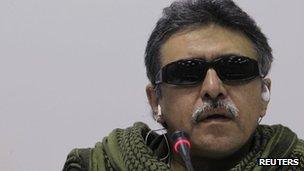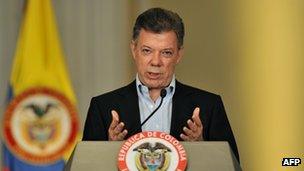Colombia peace talks 'in mambo rhythm', say Farc rebels
- Published

Farc spokesman Jesus Santrich gave an upbeat assessment of the third round of talks
Colombia's peace talks are advancing at an accelerated pace – "in the rhythm of mambo", as a Farc spokesman put it.
After three rounds of talks, Jesus Santrich said common ground on land reform had been found.
The Colombian government negotiator, former Vice President Humberto de la Calle, said there were still were stark differences, but admitted some concord.
The negotiations were launched three months ago in an attempt to end five decades of conflict.
The government says it has cost the lives of more than 500,000 people.
The talks will resume in Havana in Cuba in a week's time.
While there appear to be some fundamental differences between the two sides, the left-wing rebels seem to have adopted a conciliatory tone.
"We believe there are concrete results in these advances in the land reform proposal," said Jesus Santrich. "We believe this is a mambo rhythm. It's subdued but accelerated."
But the rebels are pressing for guarantees that the results of the talks be recognised by a constitutional assembly.
'Peace but not at any cost'
They fear a repetition of what happened in previous peace talks, when Farc members ended up being extradited after the negotiations.

President Santos said if the rebels resumed their attacks it would be "a sign of weakness".
The Colombian government had however already said that it had no intentions of submitting the results of the talks to an assembly.
Colombia's chief negotiator, Humberto de la Calle, ruled out a ceasefire, as sought by the rebels.
Farc declared the truce as peace talks began in Cuba, in November.
"We want peace, but not at any cost. Not if as a result of the conversations the guerrillas are able to get stronger and continue to wage war," he told reporters.
The Colombian government maintains its intentions of only halting military action once a peace deal has been signed.
They say the final aim of the negotiations is to get the rebels to abandon their armed struggle and join the legal political process.
Among the land reform issues proposed by the Farc is a demand that 25 million hectares (62 million acres) of land, more than 20% of the country, be handed over to the country's poor.
- Published20 January 2013
- Published14 January 2013
- Published19 November 2012